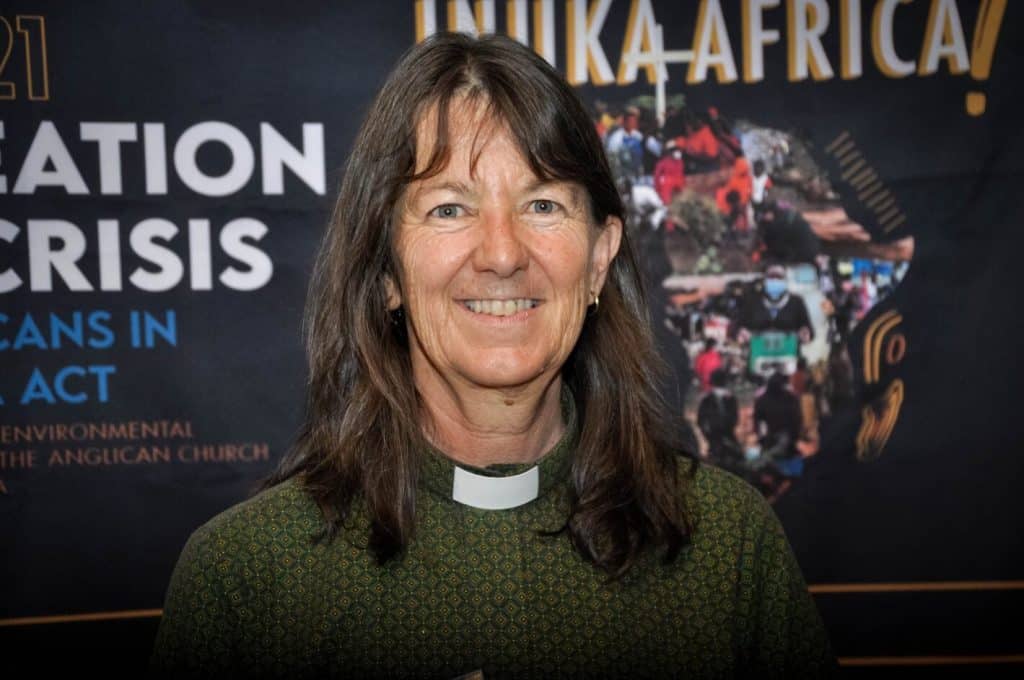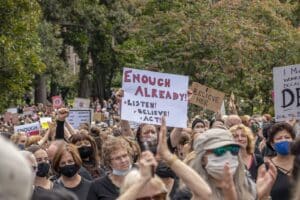
Elspeth Kernebone
13 September 2023
Each drop of rain is pleasant, but it doesn’t have any power on its own. When the drops come together though, they become a small stream, then a river. It’s when those rivers join, that they become a powerful torrent that can move mountains.
This image helps Anglican environmental educator the Reverend Dr Rachel Mash think about how individual actions can make a difference in protecting a broken world. In her work Dr Mash connects the Bible with caring for creation, supporting local action, and driving advocacy of the church.
The individual actions are like the drops of rain. But they can come together into a stream, maybe this is a parish team or a community action group. And the streams can come together into a river, possibly a regional action group, or an advocacy body or an environmental charity.
When the rivers come together, they can become a might torrent, able to move mountains.
It might even be strong enough to steer our society away from the looming iceberg.
“Our individual actions are not enough. For way too long, we have just stuck at individual actions,” Dr Mash said.
Read more: Students’ business prize hat trick focused on environment, making a difference
“But my individual actions are important when they become part of the of the stream when they become part of the river. And then when the rivers joined together, then we can really see a difference.”
Dr Mash said her call was to make sure people in the church understood that caring for the planet was core business for Christians, not an added extra. She hopes to reach a point where every Christian knows they must love God, love their neighbour – and love creation.
As part of her work, Dr Mash will visit Melbourne in October to speak at several events.
Dr Mash charts the beginning of her own journey to a conversation with her husband who had seen Al Gore’s An Inconvenient Truth, more than 10 years ago. He came back and said to Dr Mash, “Something is coming down the road for Africa which is worse than AIDS.”
She couldn’t believe this, but when she saw the film, she couldn’t unsee it. It was the start of a calling into environmental ministry.
As part of this process, Dr Mash recalls her theology of creation shifting. It moved from being very Old Testament, towards a theology of salvation which understood that Jesus came to save the whole earth, and that this salvation included the whole of creation.
Through her visit to Melbourne, Dr Mash said she hoped to help people broaden their theology – to understand that care for creation was part of their discipleship as Christians, and part of the salvation message. Then, because of that, she hoped people would change their lifestyles to some extent – and ask, “What do we as a church do?”
Read more: Religious activists seek Pacific ties to tackle climate change

This might be influencing politics, or it might be becoming carbon neutral with their buildings, it might be influencing ecosystem restoration.
And, it would also mean being centres of hope – especially for young people facing a bleak future, and feeling like older generations didn’t care.
“At the end of the day, we do believe in resurrection, most people don’t,” Dr Mash said.
“We believe in the renewal of this earth, we believe in resurrection. And we are people of faith, and we are people of hope.
“However bleak it gets, we have to believe that that God has called us to make a difference. And God has called us to work.”
Less than 10 years after Dr Mash began environmental advocacy in the church, her home became one of the world’s first major cities to almost run out of water.
In 2018 Cape Town was, at one point, just months away from “Day Zero” – the day where dam storages would reach 13.5 per cent, and taps would be turned off.
After day zero, residents would have been forced to queue to receive an allocation of 20 litres of water for each person each day.
Dr Mash remembers it as a scary period, with fears over potential violence. It would also have meant schools closing, and caused economic damage as businesses moved away and tourists avoided the previously popular holiday destination.
Three years of good rains have now fallen on Cape Town, meaning water has been in good supply. But, the region is again about to enter an El Nino cycle – which will probably mean three dry summers.
For Dr Mash the crisis revealed that even a very modern city like Cape Town was very dependent on nature. Even with modern infrastructure, if it didn’t rain, it didn’t rain. It showed that the environment was not something “out there”, but that human society was part of the web of life, for which it was called to care.
Read more: Mount Waverley church scores eco award
For Christians there was a spiritual call to be keepers and protectors of the of this web of life.
Dr Mash said this meant using less, and buying less, in recognition that there wasn’t enough.
“Our modern society and systems are very extractive, we just take and take and take. We have to realise that there isn’t enough,” she said.
“We’re called to be keepers of this amazing web of life, and we could be protectors.”
Dr Mash said identifying a “heartbreak” was a good starting point for Christians wanting to care for creation. She urged people to spend some time reflecting on which stories they were drawn to, to find where God was touching them.
Then, she said, start with the small actions. For instance, for plastic warriors, it might mean cutting any additional plastic, educate themselves, and then thinking about how to influence others, or get involved in larger organisation, or advocate for that issue with elected representatives.
Dr Mash said finding this heartbreak would be more effective than acting out of feelings of guilt, which would leave people feeling stuck and overwhelmed.
“We can’t, fight all these all these battles. We can’t all be fighting fossil fuels, and plastic, and cruelty to animals, and biodiversity loss, and everything. I mean, you’re just going to burn out,” she said.
“You need to identify, ‘What is your heartbreak? Where’s God touching you?’ because that’s where you would be under the guidance of God.”
Anglican Communion Environmental Network secretary and Anglican Church of Southern Africa environmental coordinator the Reverend Dr Rachel Mash will be speaking at the Belgrave Heights Women’s Convention on Saturday October 21. She will also preach on Sunday October 22 at Merri Creek Anglican Clifton Hill (10am), Merri Creek Anglican Fairfield (11am) and Christ Church South Yarra (6pm).
For more faith news, follow The Melbourne Anglican on Facebook, Instagram, or subscribe to our weekly emails.






